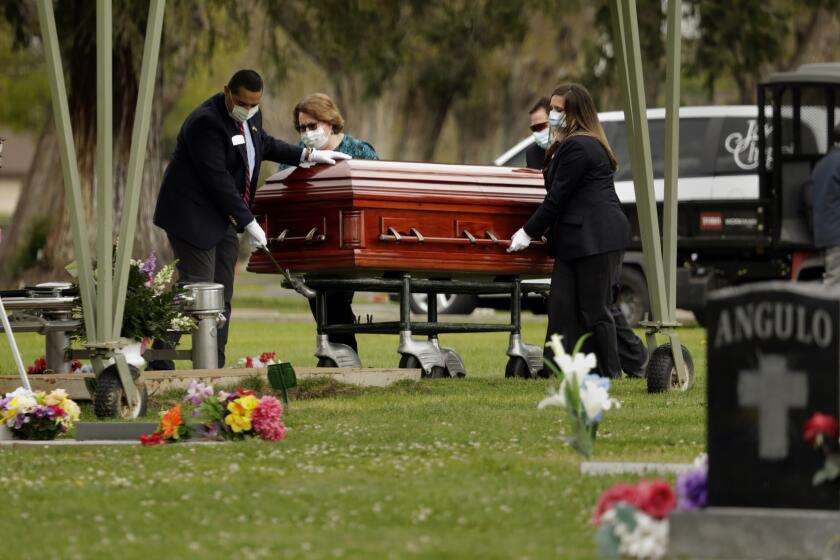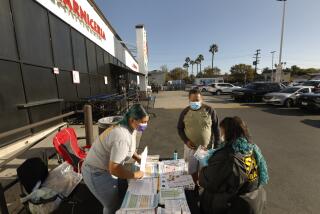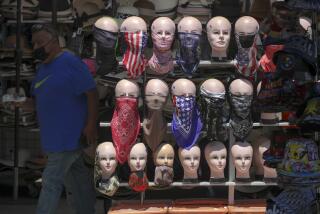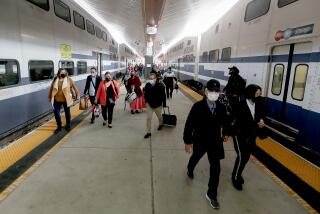California coronavirus-related death toll tops 1,000, and L.A. is hardest hit
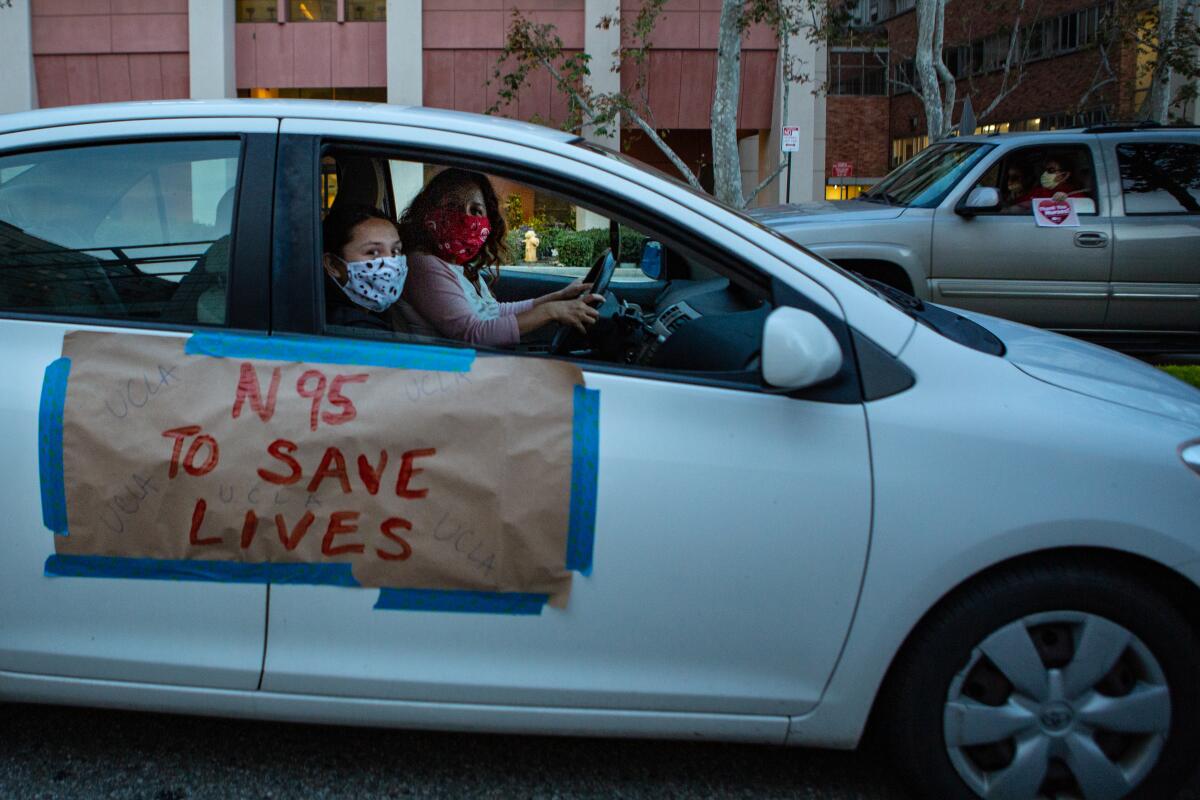
As California continues its fight against the coronavirus, the number of deaths attributed to COVID-19 in the state surpassed 1,000 on Friday — nearly half of them in Los Angeles County.
Although officials noted there has been progress in flattening the curve of new coronavirus cases, L.A. County’s death rate continues to climb. An additional 40 deaths were reported Friday, for a total of 501, and deaths are continuing to double every week, Los Angeles Mayor Eric Garcetti said Friday.
Additionally, 1,624 people are hospitalized, with 33% of patients in intensive care units, said Barbara Ferrer, L.A. County’s public health director.
Ferrer cited two possible reasons for the continued uptick: a lag between when new cases are reported and when people who become sick with COVID-19 die of the illness; and an increase in outbreaks in institutional settings.
Of those who have died, 177 were residents of such facilities, primarily skilled nursing and assisted living homes, Ferrer said. They represent about 36% of all deaths in L.A. County, she said.
In total, 2,183 people who live or work in institutional settings have been infected, including 1,215 residents and 968 staff members, Ferrer said.
“We have many more skilled nursing facilities that have seen a significant number of cases within those facilities,” she said. “And the people who are residents in those facilities are often already in fragile medical condition, and a disease like COVID-19 both spreads more easily in a congregate living situation and also can have devastating impacts on people with underlying health conditions.”
As of Friday, the L.A. County Department of Public Health was investigating 228 institutions that had reported at least one confirmed case of the coronavirus, an increase of 19 from the day before. They include 20 care facilities that had more than 20 residents test positive and four that had 40 or more residents test positive, Ferrer said.
In addition, there have been 77 confirmed cases in county jail facilities, including 17 inmates and 60 staff members, and 67 cases in federal and state prisons, including 56 inmates and 11 staff members, she said.
“We are extraordinarily worried about the outbreaks that continue to happen across the many different institutional settings,” she said.
She said the county has asked the federal Centers for Disease Control and Prevention and the state for help implementing strict infection control procedures at some of the group living sites and is also seeking staffing support to make up for a high level of absences at some facilities.
The rising death toll comes even as the growth of coronavirus cases appears to be slowing in the state. Officials have cautiously credited stay-at-home orders for the deceleration but say the trend could reverse if the restrictions are lifted too soon.
Garcetti said the city is preparing for a surge of COVID-19 cases and has opened a medical relief center at the Los Angeles Convention Center with a capacity of 175 beds for patients who don’t have the coronavirus.
“So far because you’ve done a great job flattening the curve our hospitals have been able to manage the patient volume,” Garcetti said. “But as I’ve said, our numbers continue to go up even if they go up more slowly, and people are going into hospitals more quickly than they are going out.”
As of Friday, a total of 1,551 hospital beds and 232 ventilators were available in Los Angeles, he said.
Los Angeles will continue to ramp up testing efforts, and Garcetti encouraged residents to seek testing if they believe they have been exposed to the virus.
“Even if you’re asymptomatic, we need you to get tested,” he said. “We need to know because if you don’t know, you might not be isolated from people you know. That kills people.”
The county has added 11 new testing centers in the last week and has the ability to process about 12,000 tests a day, he said.
Garcetti said the city and county were also continuing efforts to house at-risk homeless individuals in shelters, hotels and, soon, trailers provided by the state.
Homeless residents who are older than 65 or who have chronic medical conditions will be housed in the trailers in a Woodland Hills recreation center, and the city plans to acquire more than 300 additional trailers in the coming weeks, Garcetti said.
The pandemic’s toll: Lives lost in California
Hundreds of people have died in California due to the COVID-19 pandemic. These are some of their stories.
Orange County reported three additional COVID-19 deaths Friday and 77 new cases, for a total of 1,501 cases and 28 deaths. In San Francisco, 1,058 have tested positive for the virus, and 20 have died.
In the Central Valley, one worker at a Safeway distribution center has died of complications from the coronavirus, and 51 others have been infected, officials said this week.
Andrew Whelan, a spokesman for Safeway owner Albertsons Cos., said 3% of the roughly 1,700 workers at the Tracy facility in San Joaquin County had tested positive for the virus, and additional health and safety measures are now in place.
The center provides groceries to about 300 stores throughout Northern California, Nevada and Hawaii.
Though California’s coronavirus crisis began in the Bay Area, Los Angeles County now accounts for an outsize number of deaths.
The county represents a quarter of California’s population but has been the site of almost half of COVID-19 deaths, a Times data analysis found. Thursday marked the third straight day the county saw a record number of COVID-19 deaths.
The five-county Southern California region accounts for roughly 60% of deaths in California linked to the disease, though the region comprises just 48% of California’s population.
Those numbers led to California recording its worst one-day death total Wednesday, with 101 new fatalities.
Despite the continued rise in deaths, daily tallies of new cases in California suggest the spread of the virus is slowing. So does the number of COVID-19 patients in intensive care units, which has remained between 1,100 and 1,200 since April 7.
Gov. Gavin Newsom said Thursday that 1,191 Californians were in intensive care as of Wednesday — a 1.4% day-to-day increase — but that the overall number of patients hospitalized ticked down by almost 1%, to 3,141.
In Madera, friends and family paid their respects by car to a woman who died from coronavirus. She was apparently infected after attending a March 10 funeral.
“That’s good news, but again, I caution everybody: One day’s data does not make a trend,” he said.
L.A. County officials have said that although stay-at-home orders have slowed the spread of the coronavirus, they remain worried about the possibility of more outbreaks. They forecast last week that up to 30% of the county’s 10 million residents could be infected by midsummer without more behavioral changes, such as reducing shopping trips.
Even as officials stressed that the progress could be reversed if stay-at-home orders were lifted too soon, protesters across the country gathered to rally against the orders Friday. In Huntington Beach, more than 100 people, many standing close together without protective gear, called for an end to the lockdown.
Meanwhile, several Bay Area counties issued additional orders requiring residents and workers to wear face coverings when traveling to essential businesses or riding public transportation.
Dr. Grant Colfax, San Francisco’s director of public health, said the orders won’t replace the six-foot physical distancing requirement. The order will be enforced by police.
Times staff writer Maura Dolan contributed to this report.
More to Read
Sign up for Essential California
The most important California stories and recommendations in your inbox every morning.
You may occasionally receive promotional content from the Los Angeles Times.
